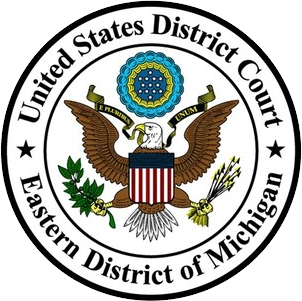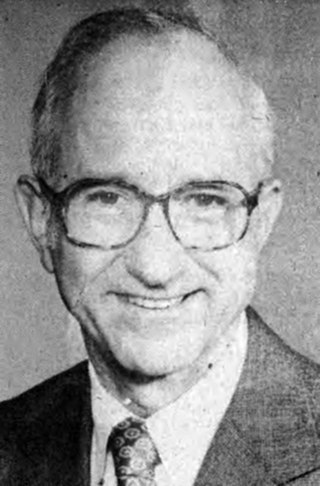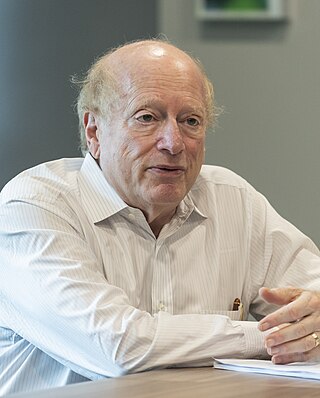
Randy Evan Barnett is an American legal scholar. He serves as the Patrick Hotung Professor of Constitutional Law at Georgetown University, where he teaches constitutional law and contracts, and is the director of the Georgetown Center for the Constitution.
Cohen v. California, 403 U.S. 15 (1971), was a landmark decision of the US Supreme Court holding that the First Amendment prevented the conviction of Paul Robert Cohen for the crime of disturbing the peace by wearing a jacket displaying "Fuck the Draft" in the public corridors of a California courthouse.

Helen Elizabeth Garrett, commonly known as Elizabeth Garrett or Beth Garrett, was an American professor of law and academic administrator. On July 1, 2015, she became the 13th president of Cornell University—the first woman to serve as president of the university. She died from colon cancer on March 6, 2016, the first Cornell president to die while in office.

Bruce Robert Jacob is a former Assistant Attorney General for the State of Florida during the early 1960s. He represented Louie L. Wainwright, the Director of the Florida Division of Corrections, in the Supreme Court case of Gideon v. Wainwright, decided in March 1963, regarding the right to counsel of indigent defendants in non-capital felony cases in state courts. The attorney representing the Petitioner, Clarence Gideon, was Abe Fortas, a Washington, D.C. lawyer who later became a Justice of the Supreme Court. The previous 1942 Supreme Court case of Betts v. Brady required the appointment of counsel for an indigent defendant at state expense if there was a “special circumstance” present in the case which made it necessary for counsel to be provided for the defendant to receive a fair trial. For example, if the defendant was indigent and was extremely young, or lacked education or experience, was unfamiliar with court procedures, or if the charges against him were complex, the trial court was required under the Due Process Clause of the Fourteenth Amendment to appoint counsel. Jacob argued against any extension of the defendant's right to counsel. The Court in Gideon overruled Betts and required state courts to appoint attorneys for defendants in all felony prosecutions.

Dean v. Utica Community Schools, 345 F. Supp. 2d 799, is a landmark legal case in United States constitutional law, namely on how the First Amendment applies to censorship in a public school environment. The case expanded on the ruling definitions of the Supreme Court case Hazelwood School District v. Kuhlmeier, in which a high school journalism-oriented trial on censorship limited the First Amendment right to freedom of expression in curricular student newspapers. The case consisted of Utica High School Principal Richard Machesky ordering the deletion of an article in the Arrow, the high school's newspaper, a decision later deemed "unreasonable" and "unconstitutional" by District Judge Arthur Tarnow.

Erwin Chemerinsky is an American legal scholar known for his studies of constitutional law and federal civil procedure. Since 2017, Chemerinsky has been the dean of the UC Berkeley School of Law. Previously, he was the inaugural dean of the University of California, Irvine School of Law from 2008 to 2017.

Thomas Eugene Baker is a constitutional law scholar, Professor of Law, and founding member of the Florida International University College of Law. With four decades of teaching experience, Baker has authored eighteen books, including two leading casebooks, has published more than 200 scholarly articles in leading law journals, and has received numerous teaching awards.

Hans Arthur Linde was a German Jewish American legal scholar who served as a justice of the Oregon Supreme Court from 1977 to 1990.

Mark Victor Tushnet is an American legal scholar. He specializes in constitutional law and theory, including comparative constitutional law, and is currently the William Nelson Cromwell Professor of Law at Harvard Law School. Tushnet is identified with the critical legal studies movement.
Constitutional theory is an area of constitutional law that focuses on the underpinnings of constitutional government. It overlaps with legal theory, constitutionalism, philosophy of law and democratic theory. It is not limited by country or jurisdiction.
Suzanna Sherry is an American legal scholar in the area of constitutional law with particular emphasis in the subject of federal courts. She is the Herman O. Loewenstein Chair Emerita at the Vanderbilt University Law School.
The Law That Never Was: The Fraud of the 16th Amendment and Personal Income Tax is a 1985 book by William J. Benson and Martin J. "Red" Beckman which claims that the Sixteenth Amendment to the United States Constitution, commonly known as the income tax amendment, was never properly ratified. In 2007, and again in 2009, Benson's contentions were ruled to be fraudulent.
Cooper v. Aaron, 358 U.S. 1 (1958), was a landmark decision of the Supreme Court of the United States that denied the school board of Little Rock, Arkansas the right to delay racial desegregation for 30 months. On September 12, 1958, the Warren Court delivered a decision that held that the states are bound by the Court's decisions and must enforce them even if the states disagree with them, asserting the judicial supremacy established in Marbury v. Madison (1803). The decision in this case upheld the rulings in Brown v. Board of Education and Brown II that had held that the doctrine of separate but equal was unconstitutional.
United States v. Kagama, 118 U.S. 375 (1886), was a landmark United States Supreme Court case that upheld the constitutionality of the Major Crimes Act of 1885. This Congressional act gave the federal courts jurisdiction in certain Indian-on-Indian crimes, even if they were committed on an Indian reservation. Kagama, a Yurok Native American (Indian) accused of murder, was selected as a test case by the Department of Justice to test the constitutionality of the Act.

William Nichol Eskridge Jr. is an American legal scholar who is the John A. Garver Professor of Jurisprudence at Yale Law School. He is one of the most cited law professors in America, ranking fourth overall for the period 2016–2020. He writes primarily on constitutional law, legislation and statutory interpretation, religion, marriage equality, and LGBT rights.
Daniel B. Rodriguez is the former Dean of Northwestern University Pritzker School of Law and holds the Harold Washington Professorship. He was the 2014 President of the Association of American Law Schools (AALS), and served on the American Bar Association's Commission on the Future of Legal Services. He currently acts as an advisor to the ABA's Center for Legal Innovation.

Ann C. Scales was an American lawyer, activist, and law professor at the University of Denver Sturm College of Law from 2003 to 2012, where she taught in constitutional law, sexual orientation and the law, civil procedure and torts.
People v. Aguilar, 2 N.E.3d 321, was an Illinois Supreme Court case in which the Court held that the Aggravated Unlawful Use of a Weapon (AUUF) statute violated the right to keep and bear arms as guaranteed by the Second Amendment. The Court stated that this was because the statute amounted to a wholesale statutory ban on the exercise of a personal right that was specifically named in and guaranteed by the United States Constitution, as construed by the United States Supreme Court. A conviction for Unlawful Possession of a Firearm (UPF) was proper because the possession of handguns by minors was conduct that fell outside the scope of the Second Amendment's protection.

Ann E. Carlson is an American attorney and legal scholar who served as the acting administrator of the National Highway Traffic Safety Administration from September 2022 to December 2024. Before joining the Biden administration, Carlson was the Shirley Shapiro Professor of Environmental Law at the UCLA School of Law, where she also served as faculty co-director of the Emmett Center on Climate Change and the Environment. She is an expert on U.S. environmental law and policy with a particular focus on climate change and environmental federalism. Biden administration withdrew her from nomination in May 2023.
Jay D. Wexler is an American legal scholar known for being the first to study laughter at the Supreme Court of the United States. His work also focuses on church-state issues, constitutional law, and environmental law. Wexler is a professor of law at the Boston University School of Law.











